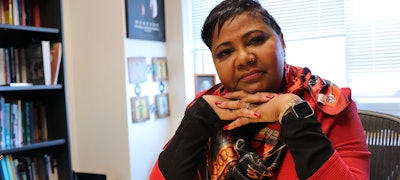As Black professionals with degrees and decades of experience in counseling, we continue to be flabbergasted, dismayed, and upset about the persistent and pervasive under-representation of Black and other minoritized professionals in counseling, psychological, and mental health professions. Whether one is a preschool, elementary school, high school, or college student of color, there is an abysmally low probability that they will have a counseling provider in a school, agency, or hospital – from their racial and ethnic background. This is especially the case for Black males. Dr. Donna Y. Ford
Dr. Donna Y. Ford
Whether white or minoritized, we are very concerned about the delivery of services with and without a multicultural focus and/or experiences, as well as troubled about providers’ level of comfort, knowledge, skills, and experiences working with Blacks and other clients of color. Broadly speaking, the counseling profession comprises mostly white helping professionals in which many are insufficiently equipped and trained in multicultural, cross-cultural, or transcultural counseling. With an increasingly growing diverse society, it is critical that service providers hire counselors, who are anti-racist and culturally competent that reflect the population that being service. The same holds true with the goals and objectives of professional development workshops.
Multicultural, cross-cultural, or transcultural competency undergirded by an anti-racist philosophy is needed among all professionals, including counseling. When counselors are cultureblind (Ford’s substitution for “colorblindness”), they are frequently uncomfortable, unable, and/or unwilling to address their clients’ prejudices (i.e., individual, institutional, structural, systemic) or racist beliefs. It is well noted that clients of color benefit from racial/ethnic matching, meaning that counselors are likely to share some or much of the lived experiences of the same-race/ethnicity clients. In our experiences, when counselors have high levels of cultural awareness and pride, they are likely to express and promote racial and ethnic pride, affirm their clients’ experiences, share coping and empowering strategies and resources, and otherwise serve as cultural brokers/bridges. Dr. James L. Moore, III
Dr. James L. Moore, III
Not surprising to us, as discussed by Kafka, for decades, a growing number of students with psychiatric and neurodiverse histories, conditions, and medications have been enrolling in college. From an access standpoint, this is terrific. Thus, from a counseling standpoint, it has meant a professional state of siege. Due to the COVID-19 pandemic and ongoing and increased racial and ethnic prejudice and discrimination, counseling providers, particularly for Asian and Black clients, are struggling to keep up with requests for help and guidance wreaked on students of color. Data on students’ mental health from the Healthy Minds Network have shown increasing anxiety and depression over the past 10 years. Data from the network’s spring survey revealed a rise from the fall of 2020 to the spring of 2021 in students who screen positive for anxiety (which grew from 31% to 34%) and depression (which increased from 36% to 41%).
A poignant reminder by Kafka is that some colleges’ counseling centers are creating more counseling and support groups to help meet the demand, but it is also in response to the needs of racial-minority (or LGBTQ) communities, students who share a particular diagnosis, students who might benefit from a specific type of therapy, or students who have common goals or problems. We added the italics to the assertion regarding ‘needs’ to highlight/emphasize that counseling must be client-centered as we and others promote and admonish in education and counseling fields. The need to recruit and retain counselors does not do justice to the work that must be done when white and minoritized counselors are not culturally competent. Our grave concerns pertain to counselors adopting cultureblindness on the one hand to being culturally assaultive on the other hand.




















